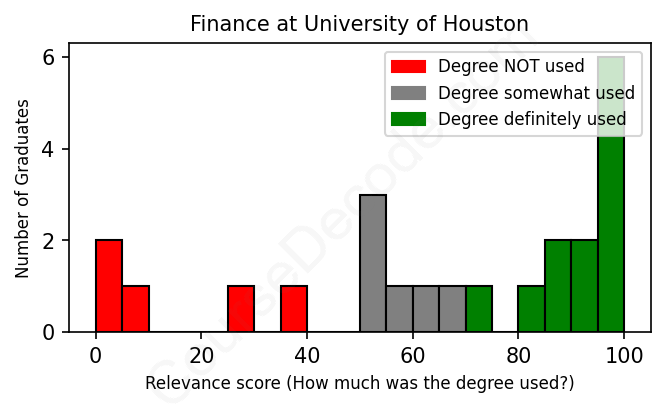
First, some facts. Of the Finance graduates from University of Houston we've analyzed , here's how many have used (or NOT used) their degree in their career:

These are estimates based on AI analysis of 23 LinkedIn profiles (see below).
The verdict? Slightly below average. Overall, with an average relevance score of 66%, Finance graduates from University of Houston have a slightly lower likelihood (-1%) of finding work in this field compared to the average graduate across all fields:
And for comparison, here's the chart for all profiles we've looked at across all degrees.
Also, after graduating, only 13% of these graduates have pursued further education other than another Bachelor's degree (such as a Masters degree or other), compared to the average across all profiles of 35%. This suggests a Bachelors degree is enough for most Finance graduates, and it's normal to look for work straight after graduation.
See the details:
|
Relevance score: 93% We think this person has gone into a career highly relevant to their degree. We think this person has gone into a career highly relevant to their degree.
DEGREE INFOGraduated in 2017 from University of Houston with a Bachelor's degree in Finance. No other secondary education since. JOB HISTORY SINCE GRADUATIONCompliance Intern KSM Apr 2017 - Sep 2017 Data Analyst 2  Virtus Partners Feb 2018 - Sep 2019 Senior CDO Analyst  U.S. Bank Sep 2019 - Nov 2022 Senior Associate  Alter Domus Nov 2022 - Present ABOUTNo information provided. |
The top 10 most common jobs done by the graduates we've analyzed (ranked most common to least) are:
Here is a visual representation of the most common words in job titles for Finance graduates (this is across all Finance graduates we've analyzed, not just those who went to University of Houston):

Looking at the careers of graduates with a Finance degree from the University of Houston, we can see some pretty varied trajectories. Generally, most graduates start out in finance-related roles like analysts, account managers, or in finance operations. Many seem to land their first jobs in structured environments like banks, consulting firms, or corporate workplaces, which is a solid way to kickstart their careers. For example, several alumni took roles as Financial Analysts, Loan Officers, or in Compliance, which indicates a strong initial footing in the finance world right after graduation.
Fast forward five to ten years, and it appears that some graduates have moved up the ladder into managerial or specialized positions—think Sales Finance Managers or Commercial Loan Specialists, which shows they are making progress in their fields. However, not everyone has stayed strictly within finance. There's a noticeable portion that has transitioned into unrelated industries such as logistics and even culinary management, suggesting that while some have maintained a solid finance focus, others have branched out. Overall, while many U of H Finance graduates have found good opportunities within finance, there are others who’ve ventured into diverse fields, showcasing both the versatility of their degree and the unpredictable nature of career paths.
Getting a Bachelor’s degree in Finance at the University of Houston—or really anywhere—can be a mixed bag. While it’s not the easiest degree out there, it’s also not the most brutal, either. You’ll definitely have to tackle some math and accounting courses, and you’ll want to get cozy with concepts like financial markets and investments. But if you have a knack for numbers and you're motivated, you can totally handle it. Just be prepared for group projects and the occasional late-night study session. Overall, it’s challenging but definitely doable, especially if you stay organized and engaged with the material!
Most commonly, in the LinkedIn profiles we've looked at, it takes people 4 years to finish a Bachelor degree in Finance.
Looking at these Finance graduates from the University of Houston, it seems like a mixed bag when it comes to their earnings. Some of them have really scored high, like the Sales Finance Manager and Commercial Finance Director who are now moving up the ladder in a solid company, which likely means good money. On the other hand, some of the earlier career folks, like the full-charged bookkeeper or those in roles like receptionist and data entry, may not be pulling in as much cash, especially right out of school. It's clear that in finance, moving up and finding the right niche can lead to better pay, but not everyone's there just yet. Overall, it looks like those who stuck with it and leveled up their roles might be doing pretty well for themselves!
Here is a visual representation of the most common words seen in the "about" section of LinkedIn profiles who have a Bachelor degree in Finance (this is across all Finance graduates we've analyzed, not just those who went to University of Houston). This may or may not be useful:

Here are all colleges offering a Bachelor degree in Finance (ordered by the average relevance score of their Finance graduates, best to worst) where we have analyzed at least 10 of their graduates: